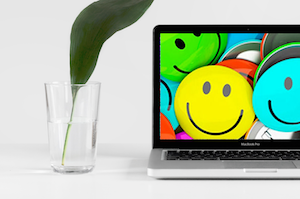People Who Trust Technology Are Happier
By Deborah Yip
Whether you're religious or not, putting your faith in science and technology could be beneficial, a new study suggests.

Whether you're religious or not, putting your faith in science and technology could be beneficial, a new study suggests.
A vast body of research suggests that religious people are happier and more satisfied with life, partly thanks to a greater sense of purpose and belonging. However, belief in God has declined over the past few decades in Western societies. What else, then, may people be turning to for security?
Researchers Olga Stavrova, Daniel Ehlebracht, and Detlef Fetchenhauer hypothesized that a belief in scientific-technological progress has risen to fill this need.

People who strongly believe in scientific-technological progress have faith that science and technology can help humanity build a better future. They’re more likely to agree that science and technology make our lives healthier, easier, and more comfortable; create more opportunities for the next generation; and make the world better off.
The researchers first surveyed individuals in the Netherlands about this belief and about their Western religious faith, measured by how often they attended religious services, and whether they identified as religious and believed in God. It was found that people who more strongly believed in scientific-technological progress or religion were more satisfied with their lives—but the link was significantly stronger for the former.
In an analysis of an expanded study on 72 countries, the researchers found that respondents with greater faith in science and technology were more satisfied with life in all but three countries, whereas religiosity was positively associated with life satisfaction in only 28 countries—and linked to lower life satisfaction in five. What gives the belief in scientific-technological progress that extra influence?
Other researchers have recently proposed that a secular belief in human progress to reform the world, including faith in science and technology, gives us a sense of control. So Stavrova and her colleagues also asked participants about their sense of personal control: how much freedom of choice and influence they felt they had over the way their lives would turn out.
It turned out that people with greater trust in science and technology indeed tended to have a heightened sense of personal control—which was in turn linked to their higher life satisfaction. This suggests that scientific understanding and use of technology may help us feel in control of our environment and future, buffering against existential anxiety and leading to greater well-being. (On the other hand, people who are more religious had a weaker sense of personal control.)
What does this all mean for us? Is the study suggesting that a belief in science is better than a belief in religion?
Interestingly, the researchers found no negative association between the belief in science and religiosity, implying that they aren’t necessarily incompatible. Both values can coexist and benefit us in different ways. Previous studies have found that people who are more religious tend to have a greater sense of “secondary control,” the kind of strength we get from being able to accept and adjust to difficult circumstances. Future research can try to pin down how these two beliefs interact, and look into other religions such as Islam.
In the end, community may play an important role in how our beliefs support our well-being. In the international study, the research team found that the link between scientific-technological faith and life satisfaction was stronger in countries where this belief was popular—and similar patterns have been found with regard to religiosity. The specific beliefs we hold may be less important than the fact that they are shared.